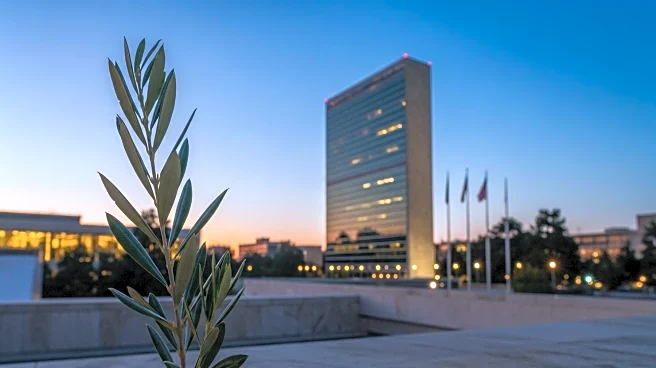What's Happening?
World leaders are set to gather in New York for the United Nations General Assembly, where President Trump will return to the podium amidst ongoing conflicts in Gaza and Ukraine. The assembly will feature speeches from nearly 150 heads of state or government, including President Trump, who has been critical of the UN's effectiveness. The UN Secretary-General, Antonio Guterres, highlighted the challenges of geopolitical divides and international cooperation under strain. The assembly will also address nuclear tensions with Iran, with Iranian President Masoud Pezeshkian and Foreign Minister Abbas Araqchi expected to attend.
Why It's Important?
The return of President Trump to the UN General Assembly is significant as it underscores the ongoing geopolitical tensions and the role of the United States in international diplomacy. Trump's previous actions, such as cutting U.S. funding to various UN agencies and withdrawing from international agreements, have raised questions about the future of multilateral cooperation. The assembly's focus on conflicts in Gaza and Ukraine, as well as nuclear issues with Iran, highlights the critical need for effective international mediation and resolution strategies. The presence of global leaders at the assembly provides an opportunity for diplomatic engagement and potential progress on these pressing issues.
What's Next?
The UN General Assembly will continue with speeches and bilateral meetings, including a summit hosted by France and Saudi Arabia aimed at advancing a two-state solution between Israel and the Palestinians. The assembly will also feature discussions on Iran's nuclear program, as Tehran seeks to avoid the reimposition of UN sanctions. The UN Security Council is expected to hold meetings on Ukraine and Gaza, although progress may be limited due to the deadlock caused by veto powers. The assembly provides a platform for leaders to address these conflicts and explore potential diplomatic solutions.
Beyond the Headlines
The assembly's focus on Palestine and Ukraine highlights broader issues of international law and human rights. The refusal of a U.S. visa to Palestinian President Mahmoud Abbas has drawn criticism and underscores the complexities of diplomatic relations. The humanitarian crisis in Gaza and the ongoing war in Ukraine raise ethical questions about global responsibility and the effectiveness of international intervention. The assembly serves as a reminder of the challenges facing the UN in balancing geopolitical interests with humanitarian needs.









